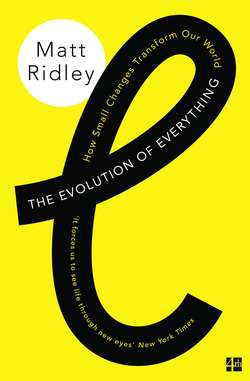Читать книгу The Evolution of Everything: How Small Changes Transform Our World - Matt Ridley, Matt Ridley - Страница 27
The lure of Lamarck
ОглавлениеThe repeated revival of Lamarckian ideas to this day likewise speaks of a yearning to reintroduce mind-first intentionality into Darwinism. Jean-Baptiste de Lamarck suggested long before Darwin that creatures might inherit acquired characteristics – so a blacksmith’s son would inherit his father’s powerful forearms even though these were acquired by exercise, not inheritance. Yet people obviously do not inherit mutilations from their parents, such as amputated limbs, so for Lamarck to be right there would have to be some kind of intelligence inside the body deciding what was worth passing on and what was not. But you can see the appeal of such a scheme to those left disoriented by the departure of God the designer from the Darwinised scene. Towards the end of his life, even Darwin flirted with some tenets of Lamarckism as he struggled to understand heredity.
At the end of the nineteenth century, the German biologist August Weismann pointed out a huge problem with Lamarckism: the separation of germ-line cells (the ones that end up being eggs or sperm) from other body cells early in the life of an animal makes it virtually impossible for information to feed back from what happens to a body during its life into its very recipe. Since the germ cells were not an organism in microcosm, the message telling them to adopt an acquired character must, Weismann argued, be of an entirely different nature from the change itself. Changing a cake after it has been baked cannot alter the recipe that was used.
The Lamarckians did not give up, though. In the 1920s a herpetologist named Paul Kammerer in Vienna claimed to have changed the biology of midwife toads by changing their environment. The evidence was flaky at best, and wishfully interpreted. When accused of fraud, Kammerer killed himself. A posthumous attempt by the writer Arthur Koestler to make Kammerer into a martyr to the truth only reinforced the desperation so many non-scientists felt to rescue a top–down explanation of evolution.
It is still going on. Epigenetics is a respectable branch of genetic science that examines how modifications to DNA sequences acquired early in life in response to experience can affect the adult body. There is a much more speculative version of the story, though. Most of these modifications are swept clean when the sperm and egg cells are made, but perhaps a few just might survive the jump into a new generation. Certain genetic disorders, for example, seem to manifest themselves differently according to whether the mutant chromosome was inherited from the mother or the father – implying a sex-specific ‘imprint’ on the gene. And one study seemed to find a sex-specific effect on the mortality of Swedes according to how hungry their grandparents were when young. From a small number of such cases, none with very powerful results, some modern Lamarckians began to make extravagant claims for the vindication of the eighteenth-century French aristocrat. ‘Darwinian evolution can include Lamarckian processes,’ wrote Eva Jablonka and Marion Lamb in 2005, ‘because the heritable variation on which selection acts is not entirely blind to function; some of it is induced or “acquired” in response to the conditions of life.’
But the evidence for these claims remains weak. All the data suggest that the epigenetic state of DNA is reset in each generation, and that even if this fails to happen, the amount of information imparted by epigenetic modifications is a minuscule fraction of the information imparted by genetic information. Besides, ingenious experiments with mice show that all the information required to reset the epigenetic modifications themselves actually lies in the genetic sequence. So the epigenetic mechanisms must themselves have evolved by good old Darwinian random mutation and selection. In effect, there is no escape to intentionality to be found here. Yet the motive behind the longing to believe in epigenetic Lamarckism is clear. As David Haig of Harvard puts it, ‘Jablonka and Lamb’s frustration with neo-Darwinism is with the pre-eminence that is ascribed to undirected, random sources of heritable variation.’ He says he is ‘yet to hear a coherent explanation of how the inheritance of acquired characters can, by itself, be a source of intentionality’. In other words, even if you could prove some Lamarckism in epigenetics, it would not remove the randomness.
